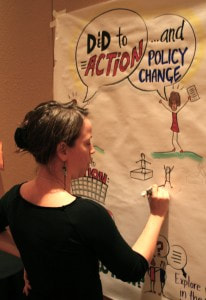 At the 2008 National Conference on Dialogue & Deliberation, we focused on 5 challenges identified by participants at our past conferences as being vitally important for our field to address. This is one in a series of five posts featuring the final reports from our “challenge leaders.” Action & Change Challenge: Strengthening the relationship between D&D and action and policy change. How can we increase the likelihood that D&D engagement streams of “exploration,” “conflict transformation,” and “collaborative action” will result in community action? How can we increase the likelihood that the “decision making” engagement stream will result in policy change? What can we learn from promising D&D efforts that did not result in the action or policy change desired? Challenge Leader: Phil Mitchell, Director of the Greater Seattle Climate Dialogues ———- Report on the Action & Policy Challenge: We are here to make the world a better place. Sometimes good process in itself is enough. Usually it is not. Usually good process must contest for power in places where power does not give up without a fight, ie., everywhere. What can we do to maximize the chance that our processes will bear fruit in terms of desired action and policy outcomes? When community action is the desired outcome, it is critical to identify and understand the key obstacles that impede moving to action. It is necessary to systematically remove these obstacles. Running a process and just hoping for good outcomes does not work. For example, in North India, Varun Vidyarthi has spent two decades figuring out how to empower those who are at the bottom of the heap even in remote, impoverished rural India. His organization, Manavodaya (Human Awakening), runs facilitated dialogue circles as a key to building self-esteem and collective identity. But he has learned that circles alone rarely succeed. The circle must have a material basis, by having each member contribute to a common fund which is used for micro-loans. Even if each member can contribute only one handful of rice per month, this changes everything. The participants have an experience of agency and of building power that changes them and changes the material conditions that have defined them. But still, groups fail. Another key characteristic of success that Vidyarthi has identified is that the group be a group of equals; mixed groups, with different levels of investment in the pool and different power backgrounds, do not succeed. And so on. Failure is a lesson in what are the obstacles to success. Each and every obstacle must be addressed. When political action is the desired outcome, it is necessary to identify and understand the leverage points controlling political power. It is necessary to try to create the conditions that make control of these leverage points possible. I wish I had a good example of this in practice. At NCDD 2008, examples were discussed, but I have been unable to confirm the details. Finally, a bigger question — if that is possible — percolated through NCDD 2008: Can we, the D&D community itself, work together towards systemic change? Can we transcend our various passionately held issues and work holistically towards shifting the whole system towards healthy, inclusive process? What might that look like?
0 Comments
Your comment will be posted after it is approved.
Leave a Reply. |
Categories
All
|
Follow Us
ABOUT NCDD
NCDD is a community and coalition of individuals and organizations who bring people together to discuss, decide and collaborate on today's toughest issues.
© The National Coalition For Dialogue And Deliberation, Inc. All rights reserved.
© The National Coalition For Dialogue And Deliberation, Inc. All rights reserved.

 RSS Feed
RSS Feed